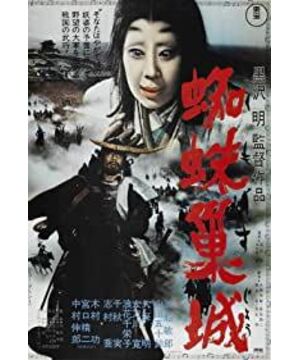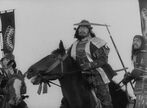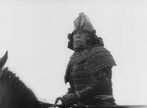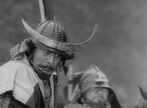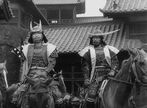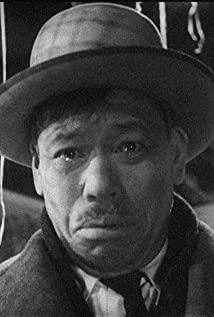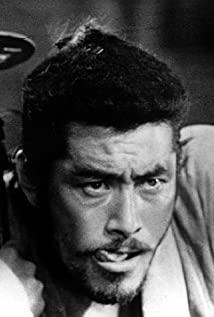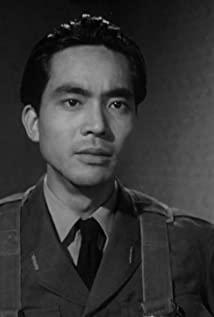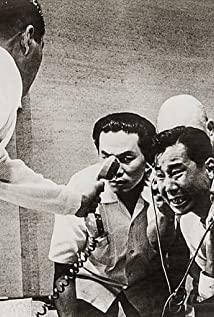"Spider" can be described as a successful adaptation of director Akira Kurosawa's "Macbeth", one of Shakespeare's four tragedies. It incorporates Noh elements, and the stage changes from Scotland in the eleventh century to Japan in the Warring States Period. These innovative changes have made The obvious traces of "adaptation" have been removed. "Spider" and "Rashomon", which was born seven years ago, can be said to be in the same line, and the intention is to show the weakness of human nature - a strong sense of self-interest. The difference is that "Luo" expresses this awareness as "a lie of self-preservation", while "Spider" shows "endless greed". It can be said that it aims a sharper spear at the heart of the people and pierces it mercilessly. . From this point of view, it is a typical "Kurosawa-style" movie.
The protagonist of the story, Washizu, was summoned by the city lord because he and Miki escorted the chaos. On the way, he got lost in the spider hand forest. A witch appeared and told the two that they would take high jobs. He will inherit him and become the next generation of the city lord. Later, the two really got the high job as the witch said. At this time Washatsu began to hesitate about his future, so he told his wife Asakusa about the experience. At the same time, there was news that the castle lord came to the Washatsu station on the grounds of hunting in the suburbs. After hearing that, Asamao instigated her husband to kill the lord, which is not the case, but also to prevent Miki from informing and causing the city lord to deliberately remove the potential "threat". When he took the spear handed by his wife, his ambition to seize power burned. Later, he planned to kill the city lord, and the son of the city lord escaped under the escort of a minister. At this time, Miki, who was guarding the city, also, according to Wu Yan, supported Washatsu as the new city lord, and because he had no children, he established Miki's son as the next generation city lord. Everything seems to be proceeding calmly according to Wu's words, but the news that Asakusa suddenly told her husband that she is pregnant has caused waves - Washu Jin is heartbroken for his son's future, and sends someone to kill Miki and his son secretly. Son escaped. Soon, Asakusa went mad due to the condemnation of his conscience, and the news of the stillbirth made it even worse. At this time, the son of Miki, the son of the castle lord and the minister launched a counterattack against Washatsu. Washatsu, who was facing the enemy, came to the forest again and asked the witch to predict good and bad luck. She said that as long as the spider hand forest did not move towards the spider nest city, then he would not be defeated. Washatsu brought this absolutely worry-free good news back to the city, but what the soldiers who defended the city later saw was that the forest was constantly "moving closer", which made them feel collapsed, and the army was in chaos - it turned out that the minister designed to make all Soldiers cut down branches as shields to protect themselves, so they came to the city. The soldiers defending the castle finally turned their backs, and Washatsu finally got a tragic ending of being shot by random arrows...
The film seems to have ended, but what about the alienation of human nature provoked by the desires of the human heart? The slow black and white picture, isn't it a vivid color reality?
Throughout this film, everyone buries themselves in the abyss of desire. Although she is not the protagonist, it is Washatsu's wife Asakusa who plays the fuse. As a woman, she has the ambition and determination not to lose to men. If she hadn't instilled in her husband the idea of "a soldier who doesn't want to be a general is not a good soldier" , give him the spear that symbolizes desire, and pass on to him that he is pregnant and does not want to make a wedding dress for others, presumably Washatsu's desire will probably be placed in his hesitant fantasy, even if he pays his own ambition. The outcome of all actions is not necessarily so tragic; of course, fundamentally speaking, Washatsu's own arrogance to seize power is the root of evil. If he doesn't make up his mind, he won't tell his wife; when he succeeds in killing the king and becomes the new city lord, Washatsu's desire becomes clearer. , driven by the strong possessive desire of "fat water does not flow to outsiders' fields", he resolutely killed the killer, and at the same time accelerated the process of digging his own grave. In the same way, Miki established Washizu as the new city lord so that his son would have the right of succession in the future; the original city lord rewarded the ministers who had made contributions to pacifying the chaos, and intended to gather loyalty and consolidate his power; the defenders of the city also defected for their own interests. All of them are real desires, which we can see one by one through their respective life choices. Come to think of it, only the witch who spoke the prophecy twice in the forest was really just a "dream bubble". "All appearances are false"——Wu Concubine does not seduce the objective source of Washatsu's desire, but is actually a reflection of her inner desire, or a mirror that sees Washatsu's own alienation. In this regard, just like the "change-changing" faces of various people present reflected by the dog that bit Khryukin in Chekhov's "Chameleon", "change-changing" is rooted in the hearts of these people. And it happened naturally and logically in the process of searching for the dog owner.
Looking at the film, "Spider" can be said to be full of the epic style of Japanese tragedy, but it maintains the original flavor of Shakespeare's play on the theme of showing the desire of the human heart and the alienation of human nature. more straightforward. In the form of light and shadow art, he properly interprets the most terrifying and most difficult to get rid of the inferiority of being a "human", and screamed at all the ecstasy in the world, hoping to open his eyes and sweat. , and then earnestly took over this human gift of facing up and reflecting on oneself.
View more about Throne of Blood reviews


